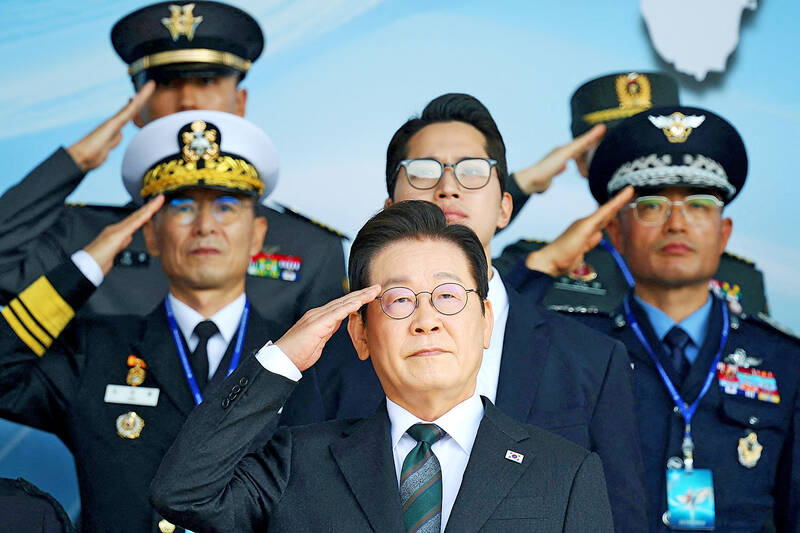South Korean President Lee Jae-myung yesterday vowed to sharply increase defense spending and build a more self-reliant military.
Lee told an Armed Forces Day ceremony in Seoul that he intended to build a strong military that can independently defend the country from external threats.
“We should move toward a strong, self-reliant defense, based on our pride and confidence in our military power,” he said. “To ensure peace and prosperity for the Republic of Korea [ROK], we must not depend on anyone else, but strengthen our own power.”

Photo: AFP
To boost a self-reliant defense posture, Lee said his government would increase next year’s defense spending by 8.2 percent to introduce advanced weapons systems such as artificial intelligence combat robots, autonomous drones and precision-guided missiles.
The government would also foster the defense industry, and improve soldiers’ welfare by upgrading their service conditions and compensation systems, he said.
Lee made no direct mention of North Korean military threats, although he said that South Korea’s spending on defense is 1.4 times more than the North’s GDP.
A potentially sensitive issue for South Korea’s alliance with the US is the implementation of an agreement to transfer wartime operational control of the allied forces to a binational command led by a South Korean general with a US deputy.
The commander of the US forces in South Korea has wartime operational control of South Korea’s military.
Many South Koreans view reclaiming their own military’s wartime operational control as a matter of national sovereignty, but others worry that it would result in a loosening of the alliance with the US.
Lee reaffirmed his support of the transfer.
“The Republic of Korea will lead a joint defense posture with Washington by regaining the operational control based on firm ROK-US alliance,” he said. “Solid combined defense capability and posture will not only bring peace and stability to the Korean Peninsula, but also contribute to the region’s stability and shared prosperity.”

People can preregister to receive their NT$10,000 (US$325) cash distributed from the central government on Nov. 5 after President William Lai (賴清德) yesterday signed the Special Budget for Strengthening Economic, Social and National Security Resilience, the Executive Yuan told a news conference last night. The special budget, passed by the Legislative Yuan on Friday last week with a cash handout budget of NT$236 billion, was officially submitted to the Executive Yuan and the Presidential Office yesterday afternoon. People can register through the official Web site at https://10000.gov.tw to have the funds deposited into their bank accounts, withdraw the funds at automated teller

PEACE AND STABILITY: Maintaining the cross-strait ‘status quo’ has long been the government’s position, the Ministry of Foreign Affairs said Taiwan is committed to maintaining the cross-strait “status quo” and seeks no escalation of tensions, the Ministry of Foreign Affairs (MOFA) said yesterday, rebutting a Time magazine opinion piece that described President William Lai (賴清德) as a “reckless leader.” The article, titled “The US Must Beware of Taiwan’s Reckless Leader,” was written by Lyle Goldstein, director of the Asia Program at the Washington-based Defense Priorities think tank. Goldstein wrote that Taiwan is “the world’s most dangerous flashpoint” amid ongoing conflicts in the Middle East and Russia’s invasion of Ukraine. He said that the situation in the Taiwan Strait has become less stable

CONCESSION: A Shin Kong official said that the firm was ‘willing to contribute’ to the nation, as the move would enable Nvidia Crop to build its headquarters in Taiwan Shin Kong Life Insurance Co (新光人壽) yesterday said it would relinquish land-use rights, or known as surface rights, for two plots in Taipei’s Beitou District (北投), paving the way for Nvidia Corp to expand its office footprint in Taiwan. The insurer said it made the decision “in the interest of the nation’s greater good” and would not seek compensation from taxpayers for potential future losses, calling the move a gesture to resolve a months-long impasse among the insurer, the Taipei City Government and the US chip giant. “The decision was made on the condition that the Taipei City Government reimburses the related

FRESH LOOK: A committee would gather expert and public input on the themes and visual motifs that would appear on the notes, the central bank governor said The central bank has launched a comprehensive redesign of New Taiwan dollar banknotes to enhance anti-counterfeiting measures, improve accessibility and align the bills with global sustainability standards, Governor Yang Chin-long (楊金龍) told a meeting of the legislature’s Finance Committee yesterday. The overhaul would affect all five denominations — NT$100, NT$200, NT$500, NT$1,000 and NT$2,000 notes — but not coins, Yang said. It would be the first major update to the banknotes in 24 years, as the current series, introduced in 2001, has remained in circulation amid rapid advances in printing technology and security standards. “Updating the notes is essential to safeguard the integrity